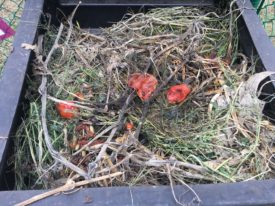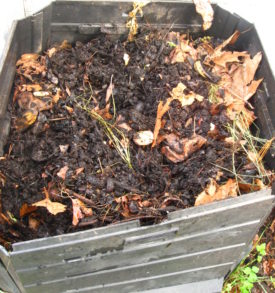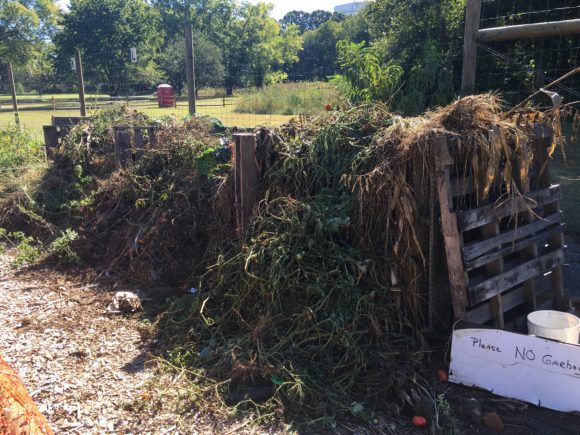It was a sunny day at the community garden, and Toni, the garden coordinator, was standing by the compost bin, regarding it with frustration. The community garden–on an open patch of wooded land by the college campus–had been established a number of years ago and had several amenities – it was enclosed by a tall chain link fence, it had a water source, and a compost bin that was divided into three sections.
Despite the ideal set-up, there were still problems the gardeners encountered, and most frustrating to Toni was the compost bin – it just didn’t make compost, despite the gardeners tossing in loads of their old plants and weeds from their plots. The three sections were meant for transferring the different stages of broken down material until it was completely composted. Instead, nothing was composting, and the big pile of dead tomato plants, shriveled radishes and dried sunflower stalks overflowed from the first bin into the second bin.
 “This isn’t how it’s supposed to work,” said Toni, scratching her head.
“This isn’t how it’s supposed to work,” said Toni, scratching her head.
“Doesn’t compost ‘just happen?’,” asked Miguel, her fellow gardener.
“I thought these materials would be broken down by now, so we could transfer them to the last bin,” lamented Toni.
“Nothing ever makes it to the ‘finished compost’ bin,” remarked Miguel.
“It’s a shame,” sighed Toni, “we could really use that compost.”
Since the community gardeners had to drive to the remote garden location, that meant they had to transport their own compost and amendments to their garden plots. They really could have used the brown gold that never emanated from the compost bins.

Now we’re getting somewhere! The online training series can help with challenges that arise in school and community gardens.
Toni is not alone in encountering obstacles in the smooth operation of a community or school garden. That is why Rutgers Cooperative Extension has developed a new online training series to help school, community and home gardeners be successful with their vegetable gardens. Whether starting a new garden or having years of experience, the online webinars can help with garden planning, picking crops, budgeting, composting, pest and disease management and food safety. A certificate of completion is available at the end of each webinar.
This training can be used by new teachers, parents, or community gardeners who are starting or taking leadership of a garden or those who just need training on a particular topic. Rutgers Master Gardener volunteers are also available to train garden groups on a variety of topics. Visit njaes.rutgers.edu/community-garden for online trainings.


